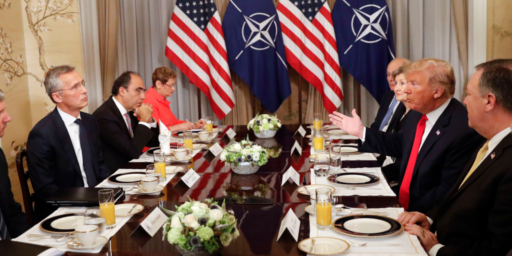INTENTION DEFICIT DISORDER
Is the very clever title of Christopher Dickey’s lastest piece in Newsweek. His thesis is that good ideas for Middle East policy are getting ruined by inept execution.
How many times have we seen good ideas-and good will–in the Middle East squandered by folks who were far too quick to make war, and far too slow figuring out how to make peace? I’ve lost count. But it keeps happening every day.
This week, for instance, President Bush had the good sense to appoint former Secretary of State James Baker as a special envoy to renegotiate Iraq’s international debt, which may be more than $100 billion. Then the Pentagon announced that three of the key creditors with whom Baker has to negotiat–Russia, France and Germany–are barred from participating in contracts to rebuild Iraq. The measure is more symbolic than substantive, since it doesn’t affect subcontractors. But the public slap has brought a furious response. Russia’s defense minister said flatly there’s now no intention to re-negotiate the $8 billion that’s owed to Moscow. Sorry, Jim.
There was a time, last summer, when a credible way for the United States to extricate itself from Iraq might have been to invite greater international participation, including the United Nations and NATO. But the administration moved only grudgingly on that front. The UN went in out of duty, but with next to no authority. Its headquarters in Baghdad got blown up. It pulled out. NATO never went in as such, remains badly divided, and the civilian geniuses at the Pentagon never miss a chance to dis what could be some of the best nation-building troops–the French, the Germans and even the Canadians. So that kind of multilateral solution is now a panacea whose sell-by date has expired, a hope of the past, even though many Democratic presidential candidates still talk about it in the present. Sorry, Howard, Wes, et al.
The same pattern applies in Middle East peacemaking. As both the Israelis and the Palestinians know, an initiative that’s stalled is an initiative that’s died. That’s why the so-called “road map” included a calendar with set dates and a verification process that called on the United States, the European Union, the Russians and the United Nations to judge whether both sides were complying at each step along the way.
***
President Bush must know that it’s not only the obvious enemies–the “bitter-enders” mounting a guerrilla war in Iraq, or the suicidal fanatics of Hamas and Islamic Jihad in the Holy Land (or, for that matter, the French or the Germans) – who stand in the way of his good intentions. It’s bureaucracy and greed, corruption, ideology and hidden agendas on our own side that have to be watched. Are there some people we call friends and allies who don’t really want a peaceful, democratic, united Iraq? Are there some who don’t want an equitable peace between a viable Palestinian state and a secure Israel?
***
There’s no shortage of interests in the Middle East that see chaos as a cash cow for military industries; or who believe so strongly in their ideological missions that they work to undermine every effort at intelligent compromise and international cooperation. And then there’s the endemic problems of lame ignorance and plain bad judgment. Eventually, folks out here get pretty cynical about good intentions.
Interesting.






This commentary makes a bit of sense if you work under the theory that the europeans would be willing to work for the best interests of the Iraqi PEOPLE. But since they were very demonstrative in their attempts to keep the Iraqi people under the rule of Mr. Hussein, that theory is hard to swallow.
I need to keep working the name of this theory but so far I’m calling it the “If we hug them they will come” theory.
That being that France and Germany really want to help us if only we were not so mean. If he hug them then they will flood us with offers of support.
The people who believe this must also believe in Tinkerbell, the Easter Bunny and Santa Clause.
—